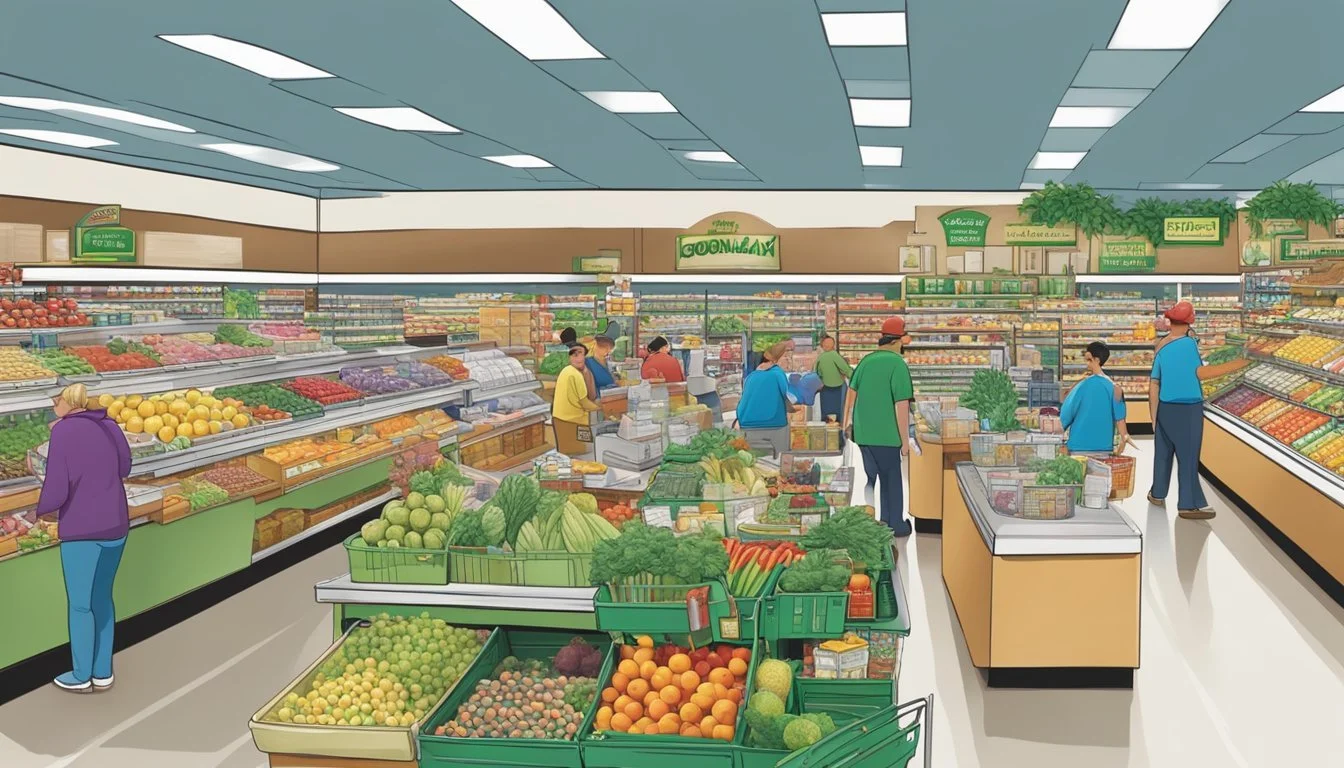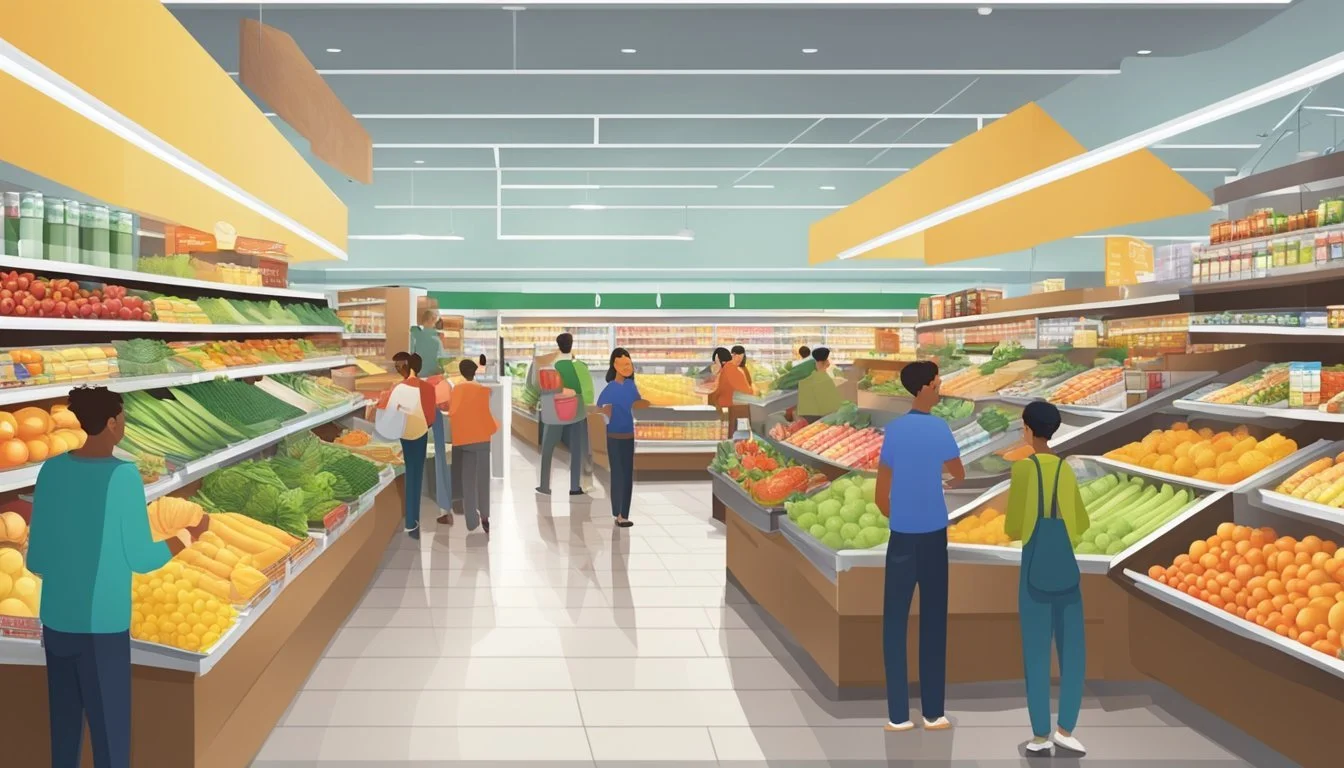FoodMaxx vs Piggly Wiggly
A Comprehensive Comparison of Prices, Selection, and Service
FoodMaxx and Piggly Wiggly are two distinct grocery store chains vying for shoppers' attention in the competitive supermarket landscape. FoodMaxx, known for its no-frills approach, offers customers significant savings through its warehouse-style stores and focus on bulk purchasing. Piggly Wiggly, on the other hand, has a rich history as one of America's first self-service grocery stores, providing a more traditional shopping experience.
When comparing prices, FoodMaxx often comes out ahead with costs averaging 21% lower than typical grocery stores. This pricing strategy makes FoodMaxx an attractive option for budget-conscious consumers looking to stretch their grocery dollars. Piggly Wiggly, while not always the cheapest, emphasizes its community roots and personalized service to appeal to shoppers who value a familiar, neighborhood feel.
The choice between FoodMaxx and Piggly Wiggly ultimately depends on individual priorities. Shoppers seeking rock-bottom prices and don't mind a bare-bones shopping environment may prefer FoodMaxx. Those who appreciate a smaller store footprint and a touch of nostalgia might find Piggly Wiggly more to their liking. Both chains have carved out their niches in the grocery market, catering to different customer preferences and shopping styles.
Company Backgrounds
FoodMaxx and Piggly Wiggly have distinct origins and development paths in the grocery retail industry. Both companies have made significant impacts on how consumers shop for groceries, albeit in different eras and markets.
History of FoodMaxx
FoodMaxx emerged as a discount grocery chain in the 1980s. It operates as a subsidiary of The Save Mart Companies, a privately held company based in California.
FoodMaxx stores are known for their warehouse-style layout and focus on bulk buying options. The chain primarily serves communities in Northern California and Nevada.
The company's business model centers on offering lower prices by reducing overhead costs. This includes strategies like having customers bag their own groceries and maintaining a no-frills store environment.
History of Piggly Wiggly
Piggly Wiggly, founded in 1916 by Clarence Saunders in Memphis, Tennessee, revolutionized grocery shopping. It introduced the novel concept of self-service grocery stores, allowing customers to select their own items.
This innovative approach drastically changed the retail landscape. Before Piggly Wiggly, shoppers gave their grocery lists to clerks who then gathered the items.
Piggly Wiggly's self-service model led to the development of supermarkets as we know them today. The chain expanded rapidly across the United States in the 1920s and 1930s.
Currently, Piggly Wiggly operates as a franchise, with most stores independently owned and serviced by C&S Wholesale Grocers. The brand maintains a strong presence in the Southern and Midwestern United States.
Store Brand and Product Range
FoodMaxx and Piggly Wiggly offer distinct product selections and store brands. Each chain caters to different consumer needs through their unique inventory and private label offerings.
Product Selection at FoodMaxx
FoodMaxx emphasizes a wide variety of products at competitive prices. Their store brand, The Save Mart Companies' private label, provides budget-friendly alternatives across multiple categories. Fresh produce is a key focus, with a diverse selection of fruits and vegetables available year-round.
The meat department features both conventional and organic options. FoodMaxx's deli section offers prepared foods and sliced meats for customer convenience. The store stocks a range of national brands alongside their private label items, giving shoppers multiple price points to choose from.
FoodMaxx also carries international foods, catering to diverse culinary preferences. Their frozen food section is extensive, providing quick meal solutions for busy consumers.
Product Selection at Piggly Wiggly
Piggly Wiggly's product range reflects its southern roots and community focus. The chain's private label, "Piggly Wiggly," spans various categories including canned goods, dairy, and household items. These store brand products offer value-conscious options to customers.
Fresh produce at Piggly Wiggly includes locally sourced items when available, supporting regional farmers. The meat department is known for its quality cuts and often features special promotions on popular items.
Piggly Wiggly's deli provides ready-to-eat meals and custom-sliced meats and cheeses. The bakery offers fresh-baked goods daily. While the organic selection may be more limited compared to some competitors, Piggly Wiggly focuses on providing staple items and regional favorites that resonate with their customer base.
Pricing and Value
FoodMaxx and Piggly Wiggly employ distinct pricing strategies to attract customers. Both stores aim to provide value, but their approaches differ in terms of product selection and pricing models.
Comparison of Pricing Strategies
FoodMaxx operates on a low-price, no-frills model. The store focuses on offering everyday low prices rather than frequent sales or promotions. This approach allows customers to consistently find competitive prices without waiting for special deals.
Piggly Wiggly, on the other hand, uses a more traditional pricing strategy. The store offers regular sales and discounts, often advertised in weekly circulars. This method can lead to significant savings for shoppers who plan their purchases around these promotions.
Both chains prioritize cost-effective alternatives, with FoodMaxx generally maintaining lower base prices. Piggly Wiggly's competitive pricing often matches or beats local competitors, especially during sale events.
Assessment of Product Quality Versus Price
FoodMaxx emphasizes value through its pricing, offering a mix of national brands and private label products. The store's focus on efficiency and bulk purchasing allows it to pass savings on to customers without significantly compromising quality.
Piggly Wiggly balances quality and affordability, particularly in its produce and meat departments. The chain often sources products locally, which can lead to fresher options at competitive prices.
Both stores offer their own private label brands as cost-effective alternatives to national brands. These store-brand products typically provide good value, with quality often comparable to more expensive name-brand counterparts.
In terms of overall value, the choice between FoodMaxx and Piggly Wiggly may depend on individual shopping habits and preferences. FoodMaxx tends to offer lower everyday prices, while Piggly Wiggly's sale prices can result in significant savings for strategic shoppers.
Shopping and Service Experience
FoodMaxx and Piggly Wiggly offer distinct shopping experiences that impact customer satisfaction. The efficiency of checkout, quality of customer service, and store layout significantly influence shoppers' preferences.
Efficiency and Checkout Experience
FoodMaxx emphasizes quick transactions with its "bag-your-own" policy. This approach often results in shorter checkout lines and faster service. Customers who value speed may appreciate this self-reliant model.
Piggly Wiggly, as the pioneer of self-service grocery stores, has a long history of efficient shopping. Their stores typically feature multiple checkout lanes to manage customer flow. Some locations offer self-checkout options for added convenience.
Both chains strive to minimize wait times, but the experience can vary based on store location and time of day. FoodMaxx's no-frills approach may lead to quicker exits, while Piggly Wiggly balances efficiency with a more traditional grocery store feel.
Customer Service and Satisfaction
FoodMaxx focuses on providing low prices, which can lead to high customer satisfaction among budget-conscious shoppers. Staff assistance is available but may be limited compared to full-service supermarkets.
Piggly Wiggly often emphasizes a more personalized shopping experience. Their stores typically offer more direct customer service, with employees available to assist shoppers throughout the store.
Customer satisfaction surveys for both chains show mixed results. FoodMaxx customers frequently cite affordability as a key satisfaction factor. Piggly Wiggly shoppers often praise the friendly atmosphere and community-oriented approach.
• FoodMaxx: Focus on low prices, limited staff interaction • Piggly Wiggly: More personalized service, community-oriented
Store Layout and Design
FoodMaxx stores are designed with efficiency in mind. The layout is often straightforward, with wide aisles and clearly marked sections. This design facilitates quick shopping trips and easy navigation.
Piggly Wiggly stores can vary in layout, as many are independently owned and operated. Generally, they follow a traditional grocery store design with departments arranged around the perimeter and aisles in the center.
FoodMaxx's no-frills approach is reflected in its minimal decor and utilitarian shelving. Piggly Wiggly stores often feature more elaborate designs, with some locations incorporating local themes or historical elements related to the brand's heritage.
FoodMaxx: Efficient, straightforward layout
Piggly Wiggly: Traditional design, potential for local flair
The store layout and design choices reflect each chain's priorities: FoodMaxx emphasizes speed and value, while Piggly Wiggly aims for a more conventional grocery shopping experience.
Consumer Engagement and Promotions
FoodMaxx and Piggly Wiggly employ various strategies to attract and retain customers. These include loyalty programs, special offers, and community involvement initiatives.
Loyalty Programs and Savings
FoodMaxx offers a digital coupon program that allows customers to load deals directly to their loyalty card. This system provides easy access to discounts on frequently purchased items. Customers can browse available coupons online or through the FoodMaxx mobile app.
Piggly Wiggly's approach to savings varies by location, as many stores are independently owned. Some Piggly Wiggly stores offer a "Pig Card" that provides exclusive discounts and personalized offers based on shopping habits.
Both chains regularly feature weekly ads with special promotions. These often include buy-one-get-one deals, discounts on seasonal items, and reduced prices on popular brands.
Community Involvement and Marketing
FoodMaxx participates in local food drives and supports various charitable organizations. The company often partners with schools for fundraising events, helping to strengthen community ties.
Piggly Wiggly stores, being locally owned, tend to have strong connections with their communities. Many locations sponsor local sports teams and participate in town events. This grassroots approach to marketing helps build customer loyalty.
Both chains use social media to engage with customers, share recipes, and announce promotions. Piggly Wiggly's regional focus allows for more targeted local marketing efforts, while FoodMaxx benefits from broader corporate campaigns.
Comparative Market Analysis
The grocery retail landscape is highly competitive, with numerous players vying for market share. FoodMaxx and Piggly Wiggly operate in distinct segments, each facing unique challenges and opportunities.
Competitors and Industry Overview
FoodMaxx, a discount grocery chain, competes primarily with other low-cost retailers like Aldi, Walmart, and WinCo. These stores focus on offering competitive prices to attract budget-conscious shoppers. Piggly Wiggly, known for its franchise model, faces competition from regional chains and independent grocers.
The industry is dominated by large national chains such as Kroger, Albertsons, and Publix. These companies leverage economies of scale to offer competitive pricing and wide product selections. Discount chains and warehouse clubs like Costco and Sam's Club have also gained market share by offering bulk purchases at lower prices.
Market Position and Consumer Preferences
FoodMaxx positions itself as a no-frills, low-price alternative in the grocery market. It appeals to price-sensitive consumers who prioritize value over store ambiance or extensive product selection. The chain's limited assortment and focus on private-label products help keep costs down.
Piggly Wiggly, with its franchise model, allows individual store owners to tailor their offerings to local preferences. This flexibility can be advantageous in serving specific community needs. Consumer Reports surveys indicate that shoppers value factors such as price, product quality, and store cleanliness when choosing a grocery store.
Regional preferences play a significant role in grocery store selection. Chains like H-E-B in Texas and Wegmans in the Northeast have cultivated strong customer loyalty through their focus on local tastes and community engagement.
Innovation and Future Outlook
FoodMaxx and Piggly Wiggly are adapting to evolving consumer preferences and technological advancements. Both chains are exploring ways to enhance the shopping experience through digital integration and personalized services.
Impact of Technology on Shopping
FoodMaxx has invested in self-checkout kiosks and mobile apps for digital coupons and shopping lists. These innovations streamline the checkout process and help customers save money. Piggly Wiggly, known for pioneering self-service shopping, continues to embrace technology. Some Piggly Wiggly franchises have implemented scan-and-go systems, allowing shoppers to scan items as they shop using their smartphones.
Both chains are exploring the use of data analytics to optimize inventory management and personalize promotions. This technology helps reduce waste and ensures popular items remain in stock.
Evolving Consumer Shopping Habits
FoodMaxx has expanded its organic and local product offerings to meet growing demand for healthier options. The chain has also introduced more grab-and-go meal solutions for busy shoppers.
Piggly Wiggly's franchise model allows individual stores to adapt quickly to local preferences. Some locations have added in-store dining areas and expanded prepared food sections to cater to customers seeking convenience.
Both chains are developing online ordering and curbside pickup services to compete with e-commerce giants. These initiatives aim to provide a seamless omnichannel experience, blending the convenience of online shopping with the immediacy of in-store purchases.
Environmental and Health Considerations
FoodMaxx and Piggly Wiggly differ in their approaches to organic offerings, locally-sourced produce, and health-conscious product lines. These factors significantly impact customer choices and shopping experiences at each store.
Organic and Local Produce Offerings
FoodMaxx provides a limited selection of organic produce, focusing more on conventional fruits and vegetables. Their organic options typically include staples like apples, carrots, and lettuce. Local sourcing is not a primary emphasis for FoodMaxx.
Piggly Wiggly, in contrast, has increased its organic and local produce offerings in recent years. Many Piggly Wiggly stores feature dedicated sections for organic fruits and vegetables. They also prioritize partnerships with local farmers, offering seasonal produce from nearby growers.
This approach supports local economies and reduces transportation-related environmental impacts. Customers at Piggly Wiggly often find fresher produce due to shorter supply chains.
Health Conscious Product Lines
FoodMaxx carries a range of health-focused products, though they are not the store's main focus. Their inventory includes some gluten-free, low-sodium, and sugar-free options. The store also stocks a selection of plant-based alternatives in their dairy and meat sections.
Piggly Wiggly has expanded its health-conscious offerings significantly. Many stores feature dedicated health food aisles with a wide array of specialty items. These include:
Organic dairy products
Gluten-free baked goods
Non-GMO snacks
Vegan meat alternatives
Piggly Wiggly also emphasizes clear labeling for allergen-free and diet-specific products. This makes it easier for health-conscious shoppers to find suitable options.
Conclusion
FoodMaxx and Piggly Wiggly offer distinct grocery shopping experiences. FoodMaxx caters to budget-conscious consumers with its no-frills approach and low prices. Piggly Wiggly, on the other hand, provides a more traditional grocery store atmosphere with a focus on customer service.
Piggly Wiggly has a strong presence in the Midwest and Alabama, appealing to shoppers who value local connections. The chain's self-service model revolutionized grocery shopping when it was introduced. FoodMaxx, while less widespread, attracts customers looking for significant savings on their grocery bills.
Both stores have their strengths and weaknesses. FoodMaxx excels in offering rock-bottom prices, while Piggly Wiggly provides a wider selection of products and a more familiar shopping environment. The choice between the two ultimately depends on individual priorities and preferences.
Budget-conscious shoppers may gravitate towards FoodMaxx for its consistently low prices. Those seeking a broader range of products and a more traditional grocery store experience might prefer Piggly Wiggly. Neither store matches the bulk-buying options of warehouse clubs like Costco, but they serve different market segments effectively.
The best choice will vary based on location, budget constraints, and personal shopping habits. Both FoodMaxx and Piggly Wiggly have carved out their own niches in the competitive grocery retail landscape.





